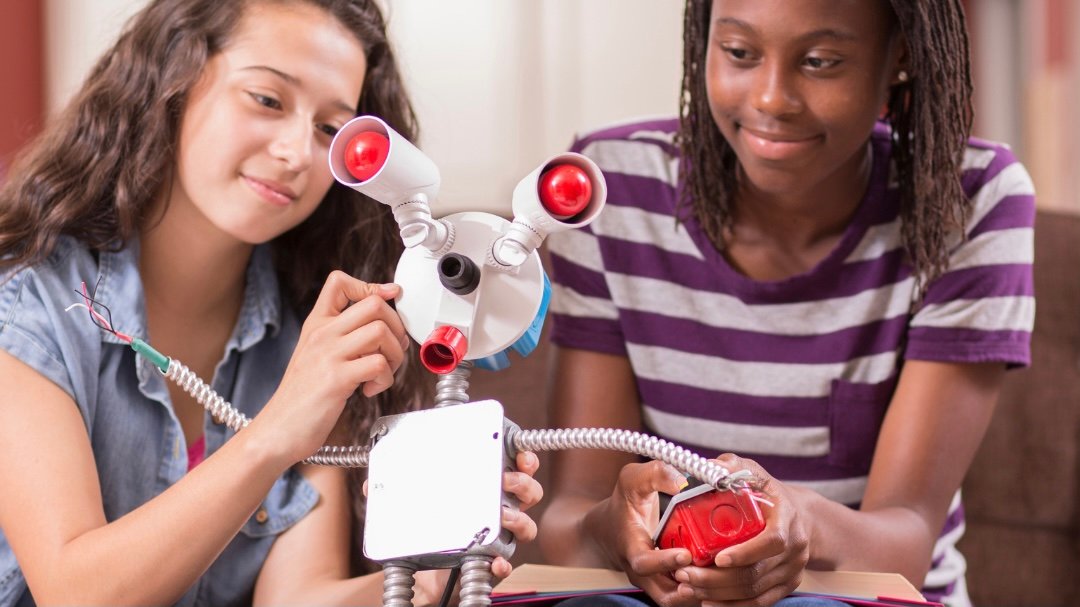
What’s Keeping Girls Out of STEM?
If we take a look at the top minds in STEM-related fields, it doesn’t take long to notice that women are greatly under-represented. On average, only about 30% of the world’s researchers are women, which is a direct result of our ongoing failures to attract girls and young women to study in fields like math, engineering, and science.
In 2015, the United Nations passed a resolution recognizing every February 11th as the International Day of Women and Girls in Science. The goal of this resolution was to support and encourage women in these fields, and to develop policies that make it easier for young girls to gain entry.
The Top 3 Barriers to Girls in STEM
As educators and parents, it’s our job to ensure that we’re supporting our girls in their studies in these important subjects – not just on February 11th, but on every other day of the year as well. If our girls are not encouraged to excel in these subjects, we’ll set ourselves up for yet another generation where these fields are dominated by men.
Today, let’s discuss what keeps our girls, especially those with learning challenges, out of STEM subjects, and how we can implement solutions that will begin to close this gender gap.
Gender Biases
Everywhere we look, there are subtle and unsubtle messages that tell our girls that STEM subjects are not ‘for them’. These gender biases are everywhere we look. Take films, for example. In most blockbuster films and TV shows, scientists, mathematicians, engineers, and researchers are played by men.
In one study of movies across the globe, just 11.6% of characters with a STEM job were played by women. In many of the countries where the movies took place, this gender balance was even more skewed than reality!
How can we inspire our girls to pursue education and work in STEM fields if they have no role models to show them this is even possible?
Race and Class
As a society, we have made major assumptions about who performs best in subjects like math or science. This bias, however unconscious, has led to academic and financial support being siphoned away from the more vulnerable race and class groups and put towards supporting those whom we believe to be more adept in these subjects.
This unequal distribution of financial and academic support has a much larger impact on performance than each student’s raw aptitude. Policies like these have profound implications for lower-income students, and girls from visible minority groups in particular.
Teaching and Grading Methods
When it comes to teaching STEM subjects, how students are taught and graded matters. One Stanford study of 8 million elementary school students’ math test scores found that there were major gender gaps that correlated to the way questions were asked. Young girls tended to perform better on open-ended questions, while their male peers outperformed them almost every time on multiple-choice questions.
Of course, changing grading can benefit all our students, but only if they’ve learned the material to start with. Teaching methods that support a variety of learning styles have been shown to help students retain and understand information better than sticking to one uniform teaching approach.
What Can Help Our Girls Embrace Their Love of STEM?
There are many barriers keeping our girls out of STEM fields. However, with a bit of creative thinking and educational support, we can ensure that our girls grow up appreciating and even loving their STEM classes. It’s this enthusiasm that can eventually lead to a young woman entering this field professionally.
So, how can we encourage our girls’ love of STEM while they’re still young? Here are some solutions to the barriers they face.
Mix Up Teaching Styles
When the classroom becomes more supportive of different learning styles, it gets easier for girls to step up to the plate in their STEM classes. This approach applies not just to grading but teaching as well.
Instead of lecturing or giving out worksheets that encourage students to listen and work separately, break up your science or math classes with some group work. Many modern STEM fields require brilliant minds who can also collaborate with others, and this skill begins when students are very young. Plus, this approach has the added benefit of shaking up friend groups and introducing students to peers that they may not connect with otherwise.
Role Models
If you’re a STEM teacher or even a parent working hard to foster a love of science or math in your young daughter, pay attention to the role models and historical figures you discuss in your lessons.
Most young people today assume that scientists are men because of what they’ve seen historically and in the media, so it’s important to counter that assumption. Teachers and parents can foster a growth mindset in students by emphasizing that practice rather than innate ability improves performance.
Build lessons around important STEM thinkers who just happen to be women or people of color. Bring in speakers and experts to talk to female students who are women of color, so they can see powerful, successful female mathematicians and scientists who look like them. This won’t erase centuries of systemic racism, but it will go a long way towards showing young people that there’s a place for everyone in STEM fields.
Mentorship
Having a mentor can improve career opportunities and provide best practices for navigating complex career paths. Both formal and informal mentorships create advantageous partnerships for young students graduating from school and heading into the workplace.
Mentors can actively address situations that might not be inherently easy for newcomers, and can help provide the knowledge and contacts necessary to set an ambitious young student on a path towards STEM success.
Finding positive mentorship can be a challenge, especially when girls are still young. The educational mentoring services we provide through Elevate are a great resource for any young girl, and can help her thrive during her schooling. Whether your daughter has learning difficulties or just needs someone to support her in realizing her superpowers, we can help.

